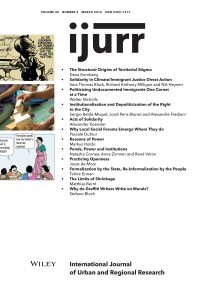While researchers in the growing field of urban political ecology have given significant attention to the fragmented hydroscape that characterizes access to drinking water in the global South, so far the (re)production of other urban waters and its related power relations have been underexplored. This article seeks to contribute to filling this gap by exploring the everyday negotiations over access to urban water bodies, in particular ponds. These are understood as a composite resource that is simultaneously water, land and public space. This analysis draws on a case study from a small city in West Bengal, India, and is based primarily on data from open interviews with different actors with a stake in urban ponds. The article demonstrates that in a context of ambiguity of the statutory governance regime and fragmented control, the (re)production of the pondscape is embedded within complex relationships of power whereby social marginalization can be offset at least momentarily by local institutions such as neighbourhood clubs and political parties.
Details
Written by:
Natasha Cornea, Anna Zimmer and René Véron
Digital Object Identifier (DOI)
10.1111/1468-2427.12377
About DOI

